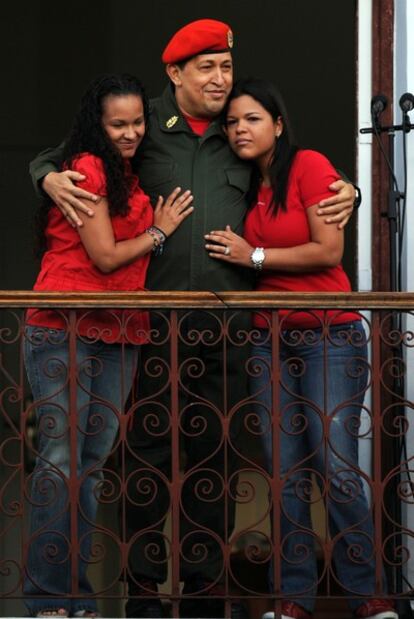Chávez embarks on cancer battle
Venezuelan leader admits "past days haven't been easy" on his return from Cuba
President Hugo Chávez returned to Venezuela from Cuba before dawn on Monday, three days after announcing to the world in Havana that he had undergone an operation to treat an unspecified cancer at a Cuban hospital. Dressed in his traditional olive-green uniform and wearing his signature paratrooper's red beret, Chávez spoke to thousands of cheering supporters in Caracas as he made an appearance on the balcony of Miraflores presidential palace.
He told Venezuelans that he was embarking on "a new battle" and that "for a period" he would be under "strict medical control," without elaborating on his condition.
"We will win this battle, and we will win it together for life, for the homeland and for the revolution," the 56-year-old president said in an address that was broadcast nationwide.
It was a triumphant homecoming for the president who had been away for a month fueling rumors that he was very ill. But mystery still surrounds the type of cancer Chávez has and how advanced it is.
Since June 10, Chávez had been hospitalized in Havana, recovering from two operations to remove what was first described as "a pelvic abscess" and then a cancerous tumor. He acknowledged on Monday that he had had to endure six hours of surgery during the second operation on June 20.
"These past few days haven't been easy," he said, adding that his doctors told him to limit his speeches to 30 minutes. "No one should think because I am here we have won this battle [...] on the contrary, we have just begun to climb the hill."
In Havana, former Cuban President Fidel Castro wrote on Sunday in his Reflections by Fidel column published in the state-run newspaper Granma that Chávez "stoically endured the pain" that affected "him with increasing frequency."
"I admit, of course, that the task that I imposed on myself was not an easy one," Castro wrote. "It wasn't hard for me to notice that he was not in good health." Medical experts consulted by EL PAÍS over the weekend believe that the Venezuelan leader may have colon cancer.
Chávez said he wanted to return to Venezuela to celebrate his country's independence-day celebrations on Tuesday but it was doubtful he would finally attend the events.
Delayed broadcast
Chávez's return at around 2am on Monday was taped by state television, but wasn't broadcast until later that morning. Among the officials waiting for Chávez on the tarmac were his vice president, Elías Jaua; Foreign Minister Nicolás Maduro; Maduro's wife Cilia Flores, who is president of the Venezuelan United Socialist Party (PSUV); and the president's brother Adán Chávez, who serves as governor of Barinas state.
During his stay in Cuba, Chávez had refused to hand over executive power to Jaua, which also raised questions over whether the Venezuelan president has full trust in his own vice president. During his absence, several government officials, including his brother Adán, began taking a more visible role, sparking speculation that some close to the president were already jockeying for position to become his successor.
Venezuela's presidential elections are a year away and many see the president's return as a boost for his campaign should he run for re-election.
Jaua told reporters that Chávez doesn't require any type of hospitalization and would be able to resume his duties, including holding a Cabinet meeting later this week, reported El Universal on Tuesday.
Paraguayan President Fernando Lugo, who is also being treated for cancer, was expected to travel to Caracas later Tuesday to meet with Chávez.

Tu suscripción se está usando en otro dispositivo
¿Quieres añadir otro usuario a tu suscripción?
Si continúas leyendo en este dispositivo, no se podrá leer en el otro.
FlechaTu suscripción se está usando en otro dispositivo y solo puedes acceder a EL PAÍS desde un dispositivo a la vez.
Si quieres compartir tu cuenta, cambia tu suscripción a la modalidad Premium, así podrás añadir otro usuario. Cada uno accederá con su propia cuenta de email, lo que os permitirá personalizar vuestra experiencia en EL PAÍS.
¿Tienes una suscripción de empresa? Accede aquí para contratar más cuentas.
En el caso de no saber quién está usando tu cuenta, te recomendamos cambiar tu contraseña aquí.
Si decides continuar compartiendo tu cuenta, este mensaje se mostrará en tu dispositivo y en el de la otra persona que está usando tu cuenta de forma indefinida, afectando a tu experiencia de lectura. Puedes consultar aquí los términos y condiciones de la suscripción digital.








































